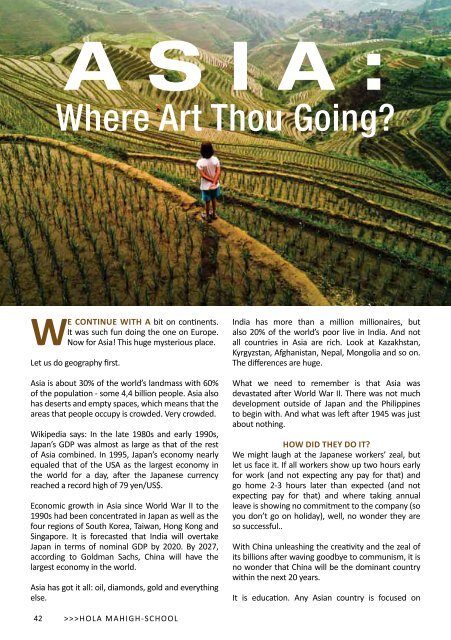Open-Day – get there!
Create successful ePaper yourself
Turn your PDF publications into a flip-book with our unique Google optimized e-Paper software.
ASIA:<br />
Where Art Thou Going?<br />
We continue with a bit on continents.<br />
It was such fun doing the one on Europe.<br />
Now for Asia! This huge mysterious place.<br />
Let us do geography first.<br />
Asia is about 30% of the world’s landmass with 60%<br />
of the population - some 4,4 billion people. Asia also<br />
has deserts and empty spaces, which means that the<br />
areas that people occupy is crowded. Very crowded.<br />
Wikipedia says: In the late 1980s and early 1990s,<br />
Japan’s GDP was almost as large as that of the rest<br />
of Asia combined. In 1995, Japan’s economy nearly<br />
equaled that of the USA as the largest economy in<br />
the world for a day, after the Japanese currency<br />
reached a record high of 79 yen/US$.<br />
Economic growth in Asia since World War II to the<br />
1990s had been concentrated in Japan as well as the<br />
four regions of South Korea, Taiwan, Hong Kong and<br />
Singapore. It is forecasted that India will overtake<br />
Japan in terms of nominal GDP by 2020. By 2027,<br />
according to Goldman Sachs, China will have the<br />
largest economy in the world.<br />
Asia has got it all: oil, diamonds, gold and everything<br />
else.<br />
India has more than a million millionaires, but<br />
also 20% of the world’s poor live in India. And not<br />
all countries in Asia are rich. Look at Kazakhstan,<br />
Kyrgyzstan, Afghanistan, Nepal, Mongolia and so on.<br />
The differences are huge.<br />
What we need to remember is that Asia was<br />
devastated after World War II. There was not much<br />
development outside of Japan and the Philippines<br />
to begin with. And what was left after 1945 was just<br />
about nothing.<br />
How did they do it?<br />
We might laugh at the Japanese workers’ zeal, but<br />
let us face it. If all workers show up two hours early<br />
for work (and not expecting any pay for that) and<br />
go home 2-3 hours later than expected (and not<br />
expecting pay for that) and where taking annual<br />
leave is showing no commitment to the company (so<br />
you don’t go on holiday), well, no wonder they are<br />
so successful..<br />
With China unleashing the creativity and the zeal of<br />
its billions after waving goodbye to communism, it is<br />
no wonder that China will be the dominant country<br />
within the next 20 years.<br />
It is education. Any Asian country is focused on<br />
42 >>>HOLA MAHIGH-SCHOOL
















